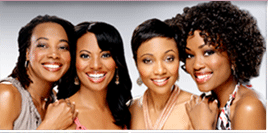


   |
Sharon's Muse.... Let's chat over coffee while I ponder some things |
About Me
My Meez 
Recent Entries
Archives
Personal
Interesting Sites
RAINE'S BLUES
GOLD MOUNTAIN
AGAIN
Need Flashplayer to view. Give time to load.
TOOL & BAD BOYS Short, Short Ebooks |
Saturday, August 11, 2007  Redefining black beauty A few months ago I posted on the subject of beauty and lookism and, in particular, who sets the standards for a whole culture. Whether we want to admit it or not, all of us in some way have been affected by media depictions of what is deemed beautiful and desirable. In the post, I noted that New York Magazine had even taken steps to redefine beauty outside of the limiting criteria set by the media and fashion industry. It was a bit of sand in an effort to build a dam against an onslaught of messages that deem only a small percentage of women (and men) as "worthy." This issue blew up in black women's faces earlier this year when Imus made his casually caustic and racist remarks about the Rutgers women basketball team. What was so "shocking" about his statement was that it was no longer an implicit message, tightly interwoven and almost invisible in blanketed statement, plots, themes rife in television, books, news and especially Hollywood. No, Imus's words were out there in your face, crystrallized with the phrase "nappy-headed hos." There was no misinterpreting what he meant. Many black women, tired of our image being constantly assaulted, rose up in arms at Imus's brazen slap in the face and refused to be appeased by his "apology." The unhealed wound was exacerbated weeks later when a stupid black male comedian (nameless for this post) appeared on Leno and reiterated Imus' sentiment, all the while trying to get the audience to go along with his putdown: "Oh, c'mon, you know those women were ugly." Unlike the Imus episode, though, there was hardly any backlash from the media simply because the perpetrator this time was black, and the media doesn't feel the need to jump into a "family fray." As I posted before, an -ism is a form of hatred, no matter who the perpetrator is. And the diligence with which these hatreds are fought sadly depends on how society views the victims. The truth is that the "worthiness" of the victims, and the empathy they will receive, rests on the disconnect between them and the masses. If there is a large disconnect, the empathy is hardly there. Instead, apathy sets in; the cold truth is that someone else's problem is never as urgent as our own. It is up to the targets of whatever -ism is coming at her to speak up for herself. And thankfully many have spoken up otherwise as blacks and women, we would hardly have any rights at all. Recently, black women have been speaking loudly and consistently, so much so that their words have been echoing across the blogosphere. And it's finally catching the attention of those within hearing distance. Just last week, the AP wire carried an item on black women dating interracially that went worldwide. Black women were back in the news again, but this time there was no pilloring to be done (although expect to see some fallout). Now it seems that Imus might have done black women a favor. With his blatant diminishment of black beauty, at least one company has decided to take a stand against his sentiment. Reading Evia's blog, which deals with black women redefining themselves against the society onslaught of negativity, as well as black women widening their options for relationship matches, I came across an interesting bit of news: Proctor & Gamble is creating a campaign for black women entitled "My Black is Beautiful" (remember the flack James Brown and Jesse Jackson got back in the day for iterating this sentiment). The program is "designed to ignite and support a sustained national conversation by, for and about black women. The initiative was created to serve as the catalyst for a movement that affects positive change in the way African American women are reflected in popular culture." Cynic that I am, I'm sure P&G is fashioning some tie-in products with this campaign, similar to Dove's Campaign for Real Beauty, which for all its positive messaging, was an effort to push beauty products aimed at women's insecurities. Even so, these messages need to be out there, more sand for those levies that need to be built up against the tide of negative images that affect women, and women of color, in particular. P&G's multicultural marketing director, Najoh Tita Reid, states, "My Black is Beautiful is a celebration of the personal and collective beauty of African American women and encourages them to define and promote a beauty standard that is an authentic reflection of their spirit." An actual call for us to redefine our own beauty standard - now that's empowering. Check out http://www.blogger.com/www.myblackisbeautiful.com. Read more!
|
| Layout Design by Hajira | Thanks to:Getty Images • Blogspot • Blogskins • |